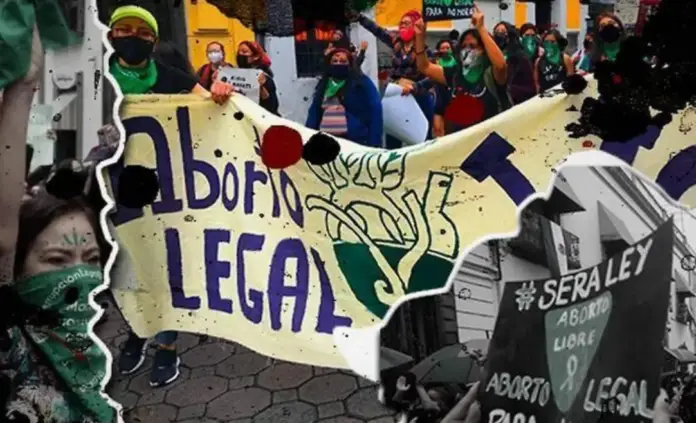In Puebla, the decriminalization of abortion did not translate into free and safe access to abortion. The changes to the state’s Penal Code, approved in 2024, did not include additional reforms to address the current backlog. This created an ambiguous regulatory context for providers, a lack of appropriate settings for safe abortion care, and, most seriously, because it is not recognized as a public health issue, the shortcomings that limit access are not addressed: lack of medications, trained health personnel, among others.
This is evident from the report “Motherhood or Punishment, Towards the Decriminalization of Abortion in Mexico,” published in February 2025 by the Information Group on Chosen Reproduction (GIRE), which classified Puebla as one of the states in the country that has been most lacking in legislation to guarantee free and safe access to abortion. Recognition of this right for pregnant people was not enough for it to be exercised.
‘Abortion Party’: Activists Demand Reform to the Health Law in Puebla
Feminists held the ‘abortion party’ where they applauded legislators for settling a historic debt with the people of Puebla.
In Puebla, abortion remains a crime, but without penalties. That’s where the problem begins, the investigation points out. This act should not be regulated by the Penal Code because it is a matter of public health and, therefore, must be included in the corresponding regulations. For this reason, the backlog in public health institutions that provide the service persists.
The decriminalization of abortion in the state is partial, as it is valid until week 12.6 for both the person who performs the abortion and the person who assists. This limit lacks scientific basis and generates confusion, which discourages its provision as a health service, the organization explains.
“The regulation that partially decriminalizes abortion—as is the case in Puebla—is confusing for healthcare personnel, given that it is still considered a crime in certain circumstances. In terms of human rights, the time-limit system hinders and limits the exercise of the right to decide, in addition to affecting the rights to equality and non-discrimination, to health and reproductive health, to a life free from violence, to personal integrity, to the free development of personality, and to reproductive autonomy,” it warns.
Furthermore, this regulatory gap encourages healthcare personnel to report women experiencing abortion-related complications instead of prioritizing immediate medical care, the document reveals. While decriminalization represented a major advance for Puebla, it has not been sufficient to recognize this right, it laments.
Gap in the Regulatory Framework
GIRE reviewed the legislation in force until December 2024. It subsequently shared that the entity’s regulations do not contemplate grounds for abortion that exclude liability, that is, where it is not considered a crime. On the contrary, there are grounds for non-punishability—which are crimes, but are not punishable—and these are: rape, danger of death, negligence or negligence, serious alterations in the fetus, and non-consensual artificial insemination.
Meanwhile, and despite the fact that the Supreme Court of Justice of the Nation (SJCN) declared the regulations protecting the right to life from conception unconstitutional, because these regulations sought to restrict other fundamental rights, for example, the right to reproductive autonomy, this provision remains in force in Puebla’s local Constitution, in Article 26, Section IV.
Puebla also lacks reforms to its local Health Law that establish the obligation to provide abortion services for women. Likewise, it fails to cite technical guidelines for abortion or specify that it is linked to the human rights of women and pregnant people, and in particular, to their right to health.
Nor has a reform been approved in Puebla that establishes, at the very least, regulatory criteria for accessibility (universal care for those who request it), quality (explicitly in abortion care), and acceptability (through the provision of medical, psychological, and social counseling before, during, and after care).
And the main shortcoming is partial decriminalization, and the continued inclusion of this act in the Penal Code.
Penal Code Limits Reproductive Autonomy
Although the reform to the Penal Code allowed limited access to abortion in Puebla, it does not abandon its restrictive approach because, even without penalties, abortion remains a crime.
This, GIRE points out, limits women’s reproductive autonomy, creates confusion about when abortion is and is not possible, and, of course, encourages criminalization of pregnant people and the denial of services.
Although the Puebla state took a significant step toward decriminalizing abortion, challenges remain.
“In this sense, abortion must be eliminated from the penal codes and be an exclusive subject of health regulations and public policy, so as to ensure the provision of information on the topic and guarantee comprehensive, safe, and quality care. Until this happens, the physical health of women and other pregnant people, as well as their social, emotional, and psychological well-being, will continue to be put at risk,” it warns.
Persistently regulating abortion through criminal law violates women’s reproductive rights. GIRE affirms that if the Puebla Congress heeds this recommendation, it would facilitate timely, high-quality, respectful, non-discriminatory, and stigma-free care.

Source: oem




